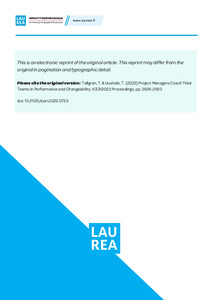Project Managers Coach Their Teams in Performance and Changeability
Tallgren, Taru; Uusitalo, Tero (2022)
Tallgren, Taru
Uusitalo, Tero
International Academy of Technology, Education and Development
2022
All rights reserved. This publication is copyrighted. You may download, display and print it for Your own personal use. Commercial use is prohibited.
Julkaisun pysyvä osoite on
https://urn.fi/URN:NBN:fi-fe2022112867443
https://urn.fi/URN:NBN:fi-fe2022112867443
Tiivistelmä
A modern project manager is a coach who supports the team to maintain changeability and the team’s competence potential. An agile manager interacts closely with both the team and customers and invests in customer understanding. His/her emphasis is on inclusion, inspiration, openness, and appreciation of feedback. A solution-focused project manager also fails fast and learns quickly and takes advantage of all the new knowledge in project management. A project manager has strong resilience and ability to change.
Laurea University of Applied Sciences (LUAS) has a project learning model, called Peer to Peer (P2P),
where students train their project management skills by leading teams in real working life business
projects. The goal of the P2P is to provide the students with an authentic learning environment to
practice modern project management. The student teams consist of groups of students where one works as a student project manager. The project teams are coached by senior lecturers. The working life partner’s role is to assign the project, co-create the project and give feedback. The student project
managers are supported by various courses and personal coaching.
The theoretical background of this article consists of coaching and solution-focused, changeability,
resilience and co-developing with the team. Earlier studies of the P2P model show that working as a
student project manager improves many traditional and modern project management skills such as
communication and negotiation skills, creativity, problem solving and teamwork and leadership skills.
This article describes the significance of the lecturer’s guidance in supporting student project managers. The lecturers support the student managers by coaching courses for student project managers and they also participate in project manager discussions. Additionally, the lecturers coach the project teams, including the student project manager, in weekly project coaching sessions.
This article also examines how project management skills develop when students study project
management in the P2P projects. The development of the project management skills was studied in the autumn in 2021. The target group of the study were student project managers who managed P2P
projects (15 ECTS) assigned by the working life partners. The main research question of this study was: “What kind of project management skills do the students learn when they work as student project managers in the P2P projects?” The research utilised an electronic survey targeted for student project managers working in the P2P projects. Responses were received from 37 student project managers.
The main result of the study shows that student managers’ competencies and skills were strengthened in areas such as delegating skills, managing entities and customer relations. According to the results, the lecturers’ guidance was useful and essential for the student project managers. It can be concluded that the practical way of learning project management increased the students’ interest in applying for project management positions in the future. The results of the study will provide knowledge of how LUAS could develop project manager education in the future.
Laurea University of Applied Sciences (LUAS) has a project learning model, called Peer to Peer (P2P),
where students train their project management skills by leading teams in real working life business
projects. The goal of the P2P is to provide the students with an authentic learning environment to
practice modern project management. The student teams consist of groups of students where one works as a student project manager. The project teams are coached by senior lecturers. The working life partner’s role is to assign the project, co-create the project and give feedback. The student project
managers are supported by various courses and personal coaching.
The theoretical background of this article consists of coaching and solution-focused, changeability,
resilience and co-developing with the team. Earlier studies of the P2P model show that working as a
student project manager improves many traditional and modern project management skills such as
communication and negotiation skills, creativity, problem solving and teamwork and leadership skills.
This article describes the significance of the lecturer’s guidance in supporting student project managers. The lecturers support the student managers by coaching courses for student project managers and they also participate in project manager discussions. Additionally, the lecturers coach the project teams, including the student project manager, in weekly project coaching sessions.
This article also examines how project management skills develop when students study project
management in the P2P projects. The development of the project management skills was studied in the autumn in 2021. The target group of the study were student project managers who managed P2P
projects (15 ECTS) assigned by the working life partners. The main research question of this study was: “What kind of project management skills do the students learn when they work as student project managers in the P2P projects?” The research utilised an electronic survey targeted for student project managers working in the P2P projects. Responses were received from 37 student project managers.
The main result of the study shows that student managers’ competencies and skills were strengthened in areas such as delegating skills, managing entities and customer relations. According to the results, the lecturers’ guidance was useful and essential for the student project managers. It can be concluded that the practical way of learning project management increased the students’ interest in applying for project management positions in the future. The results of the study will provide knowledge of how LUAS could develop project manager education in the future.
